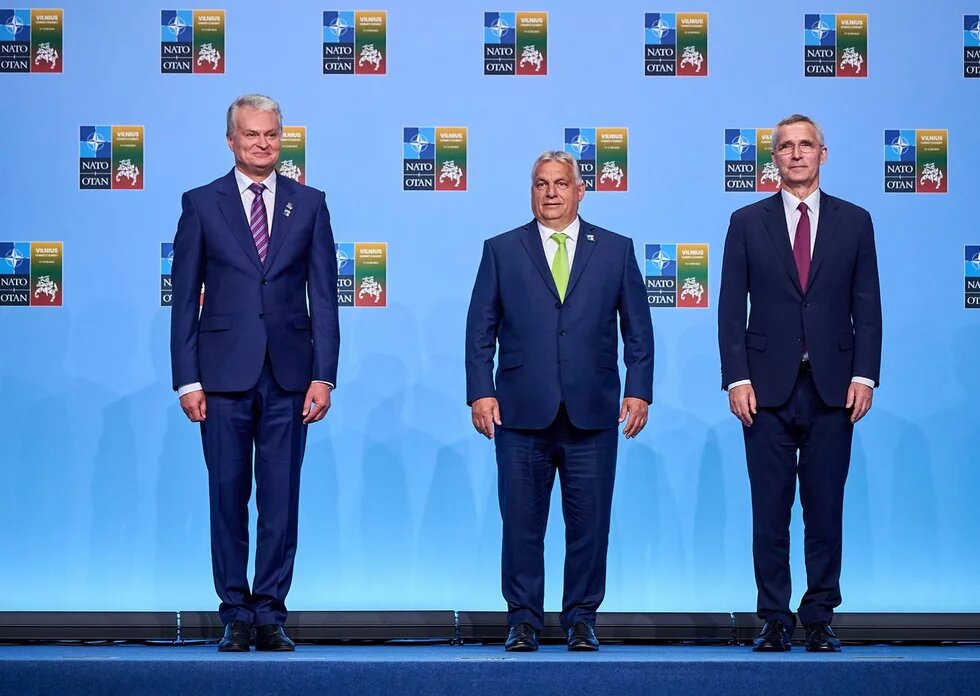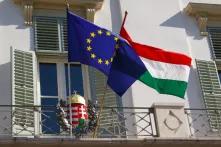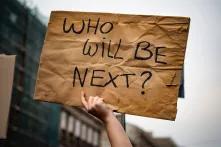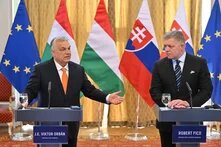With the Hungarian EU presidency quickly approaching, it is instructive to examine how the Orbán administration has positioned itself through its global diplomatic visits over the last few years.

At the end of last year, Viktor Orbán made the unusual diplomatic move of meeting ex-president Donald J. Trump at his Florida residence in Mar-a-Lago during his visit to the United States of America, which was somewhat of a surprise. He did not meet with current President Joseph R. Biden and was not invited to an official visit at the White House.
Orbán’s behaviour in the US is not highly surprising to seasoned followers of Hungarian foreign policy. If we were to assume that rationality is behind that policy, then one might expect the Hungarian PM to mostly focus his diplomatic efforts on the country’s main economic and strategic partners, but this seems to be far from the case. According to World Bank data, Hungary’s main import and export targets are European countries, with Germany leading in both categories. The main importers of Hungarian goods are Germany, Italy, Romania, the Slovak Republic and Austria. Hungary is also mostly a market for European products, with the exception of China, which is the second-biggest importer of Hungarian products. Hungary’s economic interests lie mainly with the West, therefore, and its geopolitical interests are not much different. Hungary is also a member of the EU and NATO, two political alliances which have become increasingly definitive of their members’ political interests, especially in light of the war in Ukraine.
One would expect Orbán to have his closest, or at least most frequent, relations with his allies, therefore. However, neither the economic nor the political axis may be determining Orbán’s preferences when it comes to meeting and working with his fellow leaders. The PM frequently favours meeting and fostering relationships with his ideological allies and with an all but ragtag band of autocrats from across the world.
When meeting his fellow EU leaders, the Hungarian PM has often been sidelined in recent years and has been less welcome among EU summit participants as a consequence of his divisive, frequently anti-EU political stance. This “bad boy of the bloc” earned the nickname “the Viktátor” from former European Commission President Jean-Claude Juncker, who shared that infamous nickname with Orbán along with a literal slap to his face in front of the cameras.
Lately, PM Orbán has soured Hungary’s relationships with Sweden by blocking the ratification of its NATO membership a few months after even the Turkish government had already approved it. Members of the Hungarian government, without any real reason for doing so, demanded that Sweden send its prime minister to Budapest for negotiations. They could not name a topic to be discussed during such talks, however, according to media reports from the Hungarian government’s Kormányinfo weekly press briefing. Yet despite the questionable results of its foreign ties and economic relations, the Hungarian government spends lavish amounts on official diplomatic trips, according to media reports. Foreign Minister Péter Szíjjártó famously has a big appetite for taking flights on private planes to meet his colleagues.
Opening to the East
On the flip side, the Hungarian leader has met multiple times with Russian President Vladimir Putin and Turkish President Recep Tayyip Erdoğan, and has frequently flown eastwards to shake hands with Central Asian and Chinese leaders. He was famously the last EU leader to meet Putin literally days ahead of the start of the full-fledged Ukrainian war in 2022. Some of these notable meetings include several visits by Putin to Budapest, as well as meetings in Moscow and at international forums like the Beijing Summit. Their interactions have often been centred around energy agreements, geopolitical discussions, and maintaining their relationship despite the broader EU sanctions against Russia. For example, Orbán has consistently met with Putin to discuss energy supplies, most notably natural gas and the next phase of construction of the Paks Nuclear Power Plant, an infamous and notoriously tardy Russian nuclear energy venture involving a financing deal with Russian banking institutions. In hydrocarbons, Hungary relies on Russian sources through both the Brotherhood Pipeline and the TurkStream Pipeline for natural gas, and relies on the Druzhba (Friendship) Pipeline for oil.
Countries like Turkey, China or Russia can at least be considered important economic and strategic actors. Small countries such as Hungary can argue that they do not want to jeopardize an important relationship over ideological differences on democracy or human rights. However, Orbán not only extensively panders to the big autocracies, but is also willing to go the extra mile to pander to small, relatively unimportant autocratic allies. As an example, take the incident in which a NATO soldier from Azerbaijan was released from prison after brutally murdering his roommate, Armenian soldier Gurgen Margarjan, with an axe in Budapest. After the Hungarian side allowed the “Azeri axe-killer” to be released to his home country, he was set free and celebrated as a hero - as everyone at the time predicted and warned would happen.
Orbán even protects indicted individuals if his Fidesz party’s administration is sympathetic to them. Hungary gave asylum and later permanent residency to the former North Macedonian prime minister Nikola Gruevski, who fled a jail sentence in his native country in 2018. In another regional diplomatic affair, Hungary refused to hand over to the Croatian authorities one Zsolt Hernádi, the CEO of MOL, an oil and gas giant owned by the Hungarian state, as part of an investigation into serious accusations of corruption concerning MOL’s investments in the Adriatic country. Hungary also did not improve its foreign policy reputation when its Ambassador to Peru was secretly brought back home after Interpol told the government that Gábor Kaleta had been caught with paedophilic content on his work laptop (this was done to avoid his being taken into custody by local police).
A snapshot of Hungary's foreign policy
For a contemporary snapshot of Hungary’s foreign policy, we looked at Orbán’s Twitter (now X) feed a bit to check on which leaders he visits, posts about, likes, and dislikes. Here is a brief list up to 24 April of this year: After scrolling through two posts railing against “Brussels”, we arrive at his meeting with Swiss President Viola Amherd, who met many prominent Hungarian politicians from the governing party in Budapest on 19 April. While Amherd is at least a European leader sharing some strategic interests with Hungary, she is also a conservative leader, predictably. Her party, The Centrists, was actually formed as a merger of Christian-conservative groups, putting her in the right ideological ballpark for Orbán.
After some more “Brussels” posts and a message condemning a recent aerial drone and missile attack on Israel (not addressing any other aspects of the conflict) we come to Orbán’s state visit to Morocco, where he met with Aziz Akhannouch, the prime minister of the country. Hungary and Morocco have no noteworthy ties, but Akhannouch could seem appealing, if you are Orbán. He is incredibly rich, politically connected to the Moroccan royal family, and rose into power through making loosely-based, borderline populist economic promises, removing the then-governing Islamists from power – all of which falls within Orbán’s preferred characteristics. Morocco’s human rights record is also mixed at best, with freedom of expression on certain topics being insecure and the imprisonment of critics of the government being very much present, but this did not seem to be a concern for this visit.
In our last few stops on X we move first to Sarajevo, with Orbán talking about the EU’s expansion into the Balkans (also a favourite topic of Orbán personally). After this, he almost seems to be back on track with a meeting between some EU prime ministers and Charles Michel, the European Council President. Unfortunately, that post concludes with “Make Europe Great Again!” and the telling “#MEGA”, which at least allows us to speculate as to the tone of that bilateral meeting.
Next up is Orbán personally congratulating Professor Ryszard Legutko, a Polish MEP and academic who has been given Hungary’s Hunyadi János Award. He is certainly what you would call an ideological friend of Orbán. Legutko views homosexuality as an "unnecessary, destructive experiment", or alleges that "Christians are the group that has been the most discriminated against", views which resonate well with Orbán. We conclude our tour through Orbán’s travels with his infamous visit to Mar-a-Lago, combined with his participation in the conservative Heritage Foundation’s conference.
If one were to go down this rabbit hole further, things like Orbán’s visit to Turkey to meet President Erdoğan, or Erdoğan coming to Hungary, or Orbán’s shoutout to Brazilian President Bolsonaro, or his meetup with Azerbaijani President Ilham Aliyev would strongly dominate what one would discover. At the end of the day, it is easy to argue that Orbán disproportionately favours meeting his ideological friends, with maybe an occasional meeting with the politicians with whom he logically should be meeting – based on the Hungarian national interest – also squeezed into his schedule.
No matter where Orbán travels or whom he visits, one thing is certain: It will not be cheap for the Hungarian taxpayer. Based on data acquired by RTL from the Ministry of Foreign Affairs and Trade, Viktor Orbán made 51 official visits abroad between January 2022 and June 2023. Eighteen of them were on an Airbus A319 special aircraft purchased by the Hungarian Defence Forces.
If we calculate his per diems, accommodation and travel expenses, then approximately 1.34 million euros have been spent so far in this term of his in office on a total of 51 trips. RTL dug into the data to find that, for example, a seven-member delegation to Paris in January 2023 cost 13,844 euros, or 1,997 euros per person. Another questionable state expense was related to Orbán’s trip to the Italian city of Pisa which, according to public data requests, cost taxpayers around 10,000-13,000 euros while seemingly serving primarily the private interests of the Hungarian prime minister.
Lastly, in another widely-reported case, Hungarian diplomats used state resources to “bring home” one of PM Orbán’s adult children, Gáspár Orbán, from Uganda by deploying the TEK, a government agency responsible for domestic and international counter-terrorism.
The authors are journalists of the Eurologus.hu platform


